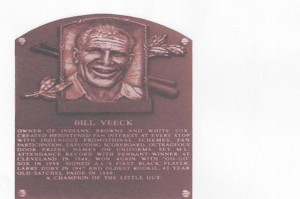Mending a Broken Heart [2nd Inning]
Growing up the White Sox were owned by baseball maverick Bill Veeck, the guy who put a midget, Eddie Gaedel, in uniform (just to get a walk), the inventor of the exploding scoreboard (for the rare White Sox home runs), and author of the book Veeck – As in Wreck. A careful read of his book discloses that Veeck didn’t have a lot of money, always used other people’s money putting a syndicate together to own a team. In fact, Veeck started his baseball career as an Assistant Groundskeeper at Wrigley Field and was the guy who planted the ivy that Wrigley is now famous for. Just a guy who loved baseball.
There was lots to like about Bill Veeck. He was the first American League owner to have a Black ballplayer, Al Doby. He had grade school kids draw pictures of their favorite White Sox; then had the best drawings framed and on display at the ball park. When Martin Luther King marched to integrate Cicero, Bill Veeck joined hand-in-hand with Dr. King. He installed a shower in the centerfield cheap seats for fans to cool off in on hot days. One time, when he owned the forlorn St. Louis Brownies, attendance was way down and he hit on the idea to have the fans manage a game. The scoreboard would give two alternatives: scorebooks held high by the fans meant one choice; held low the other. Of course the other team didn’t need to bother stealing signs that day, but it was September and the lowly Brownies were already out of the pennant race. Veeck always claimed he sold more scorebooks that day than any day in baseball and it was the best attended game of the season.
About the time I got cut from the high school team, Veeck sold the Sox — only to re-purchase them my last year of law school. In the meantime Curt Flood, a St. Louis centerfielder, had sued major league baseball and opened the flood gates to free agency. Before then a player was a serf to one team for life: take the pay offered or don’t play. Under free agency, once a current multi-year contract expires, a player is free to negotiate with any team to get the best salary offer. This led to the ’77 White Sox being known as “The South Side Hit Men” using the “Rent-A-Player” concept, a Bill Veeck invention: In the last year of a contract, a team not in contention might be willing to trade a veteran for future prospects knowing the veteran would likely sign elsewhere at the end of the year, and Veeck would get the other team to pay the slugger’s salary through the end of the year. For the first time in my life the White Sox were the best hitting team in baseball with Richie Zisk, Oscar Gamble, Carlton Fisk, Eric Soderholm, Don Kessinger, all rounded up from other teams.
My best friend out east was from Brooklyn and hadn’t been to a major league game since the Dodgers left in 1956. A friend of ours, Carol, needed a lift from New York to Chicago, so we headed out on a road trip, arriving in Chicago on July 3rd. That night the Sox were playing the Texas Rangers, with Fourth of July fireworks promised after the game, and I suggested we go to the park. Carol and her friends wanted to go along so there were five of us. We bought a fifth of tequila to smuggle in.
When we arrive it’s already the 2nd inning and the game is a sell-out, but the usher at the gate was willing to let us in for a $20 bill. With no seats, we had to sit in the aisle. Upper deck, first row, behind first base, best seats in the house to catch a foul ball. We made friends with our neighbors. Everybody put a dollar in a hat for the person who glugged the worm at the bottom of the tequila bottle. Then we started another collection for who caught the first foul ball. When it left the bat I knew it was heading our way, although it started to fade back towards the infield the closer it got. At the last second I stretched over the railing and caught the ball. Thank goodness my friends held on to me so I didn’t tumble all the way to the first deck. What a way to get back in the game! Richie Zisk even hit a game winning, walk-off homer, in the bottom of the 9th. A “walk-off” is when a ball hit over the outfield fences gives you the lead in the bottom of the last inning and you get to “walk” around the bases while your team walks off the field victorious. Later that night I was rounding bases with Carol.
